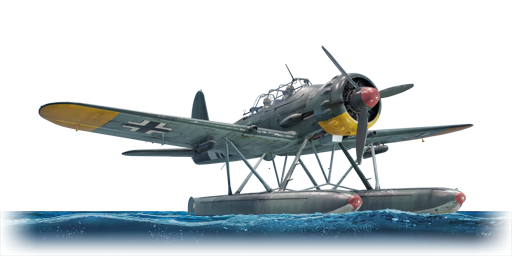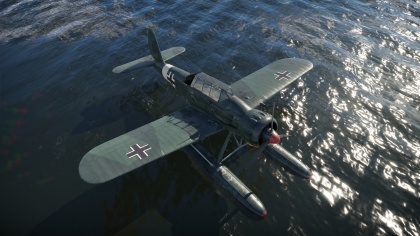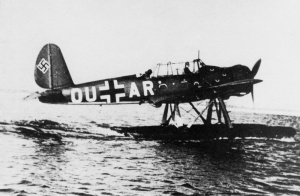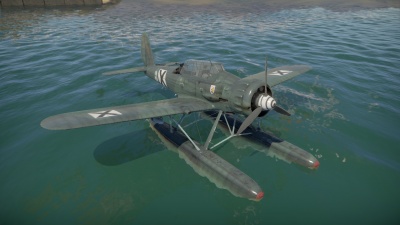Difference between revisions of "Ar 196 A-3"
Bonisducks (talk | contribs) (→History: Done History and References.) (Tag: Visual edit) |
(Edits) |
||
| Line 7: | Line 7: | ||
The '''{{Specs|name}}''' is a premium gift rank {{Specs|rank}} German bomber {{Battle-rating}}. It was introduced during [[Update "Starfighters"]] as a reward for the [[wt:en/news/6808-special-operation-s-u-m-m-e-r-2020-en|2020 Operation S.U.M.M.E.R.]] event. | The '''{{Specs|name}}''' is a premium gift rank {{Specs|rank}} German bomber {{Battle-rating}}. It was introduced during [[Update "Starfighters"]] as a reward for the [[wt:en/news/6808-special-operation-s-u-m-m-e-r-2020-en|2020 Operation S.U.M.M.E.R.]] event. | ||
| − | The German Ar 196 A-3 hydroplane, one of the best naval scouts in history, nicknamed "the eyes of the Kriegsmarine"! The Ar 196 A-3 has every chance of becoming the new | + | The German Ar 196 A-3 hydroplane, one of the best naval scouts in history, nicknamed "the eyes of the Kriegsmarine"! The Ar 196 A-3 has every chance of becoming the new "king of the sandpit": it is armed with a pair of 20mm MG FF cannons and an MG 17 rifle caliber machine gun, it can also carry 2x50 kg bombs under its wings. The Ar 196 A-3 also has a defensive turret with a 7.92mm machine gun, which is quite good in the initial ranks. And of course, just like the other hydroplanes in the game, the Ar 196 A-3 is able to capture control points in naval battles. <ref>[[wt:en/news/6809/current|Devblog]]</ref> |
== General info == | == General info == | ||
| Line 101: | Line 101: | ||
== Usage in battles == | == Usage in battles == | ||
<!-- ''Describe the tactics of playing in the aircraft, the features of using aircraft in a team and advice on tactics. Refrain from creating a "guide" - do not impose a single point of view, but instead, give the reader food for thought. Examine the most dangerous enemies and give recommendations on fighting them. If necessary, note the specifics of the game in different modes (AB, RB, SB).'' --> | <!-- ''Describe the tactics of playing in the aircraft, the features of using aircraft in a team and advice on tactics. Refrain from creating a "guide" - do not impose a single point of view, but instead, give the reader food for thought. Examine the most dangerous enemies and give recommendations on fighting them. If necessary, note the specifics of the game in different modes (AB, RB, SB).'' --> | ||
| − | '''Realistic:''' The Arado Ar 196 excels at destroying light ground targets, and with its twin MG FF armament it can head-on virtually any aircraft at the BR and win. Compound that with the fact that there are many inexperienced players at the BR who will head-on any target they meet, and it will be easy to accrue kills. However, the 196 loses energy very easily due to the 2 massive floats strapped to the bottom of the fuselage. The 196 usually goes out in a "blaze of glory" early on into the match, due to the playsytle revolving around killing ground targets. | + | '''Realistic:''' The Arado Ar 196 excels at destroying light ground targets, and with its twin MG FF armament it can head-on virtually any aircraft at the BR and win. Compound that with the fact that there are many inexperienced players at the BR who will head-on any target they meet, and it will be easy to accrue kills. However, the 196 loses energy very easily due to the 2 massive floats strapped to the bottom of the fuselage. The 196 usually goes out in a "blaze of glory" early on into the match, due to the playsytle revolving around killing ground targets. |
=== Manual Engine Control === | === Manual Engine Control === | ||
| Line 161: | Line 161: | ||
=== Pros and cons === | === Pros and cons === | ||
<!-- ''Summarise and briefly evaluate the vehicle in terms of its characteristics and combat effectiveness. Mark its pros and cons in the bulleted list. Try not to use more than 6 points for each of the characteristics. Avoid using categorical definitions such as "bad", "good" and the like - use substitutions with softer forms such as "inadequate" and "effective".'' --> | <!-- ''Summarise and briefly evaluate the vehicle in terms of its characteristics and combat effectiveness. Mark its pros and cons in the bulleted list. Try not to use more than 6 points for each of the characteristics. Avoid using categorical definitions such as "bad", "good" and the like - use substitutions with softer forms such as "inadequate" and "effective".'' --> | ||
| − | |||
'''Pros:''' | '''Pros:''' | ||
| − | * Cannon armament | + | * Cannon armament |
* Tail gunner for fighters that will inevitably be on your tail | * Tail gunner for fighters that will inevitably be on your tail | ||
* Powerful guns for BR | * Powerful guns for BR | ||
| Line 179: | Line 178: | ||
== History == | == History == | ||
| − | <!-- ''Describe the history of the creation and combat usage of the aircraft in more detail than in the introduction. If the historical reference turns out to be too long, take it to a separate article, taking a link to the article about the vehicle and adding a block "/History" (example: <nowiki>https://wiki.warthunder.com/(Vehicle-name)/History</nowiki>) and add a link to it here using the <code>main</code> template. Be sure to reference text and sources by using <code><nowiki><ref></ref></nowiki></code>, as well as adding them at the end of the article with <code><nowiki><references /></nowiki></code>. This section may also include the vehicle's dev blog entry (if applicable) and the in-game encyclopedia description (under <code><nowiki>=== In-game description ===</nowiki></code>, also if applicable).'' -->[[File:Ar 196 A-2.jpg|thumb|Arado Ar 196 taxiing at sea in 1940.]] | + | <!-- ''Describe the history of the creation and combat usage of the aircraft in more detail than in the introduction. If the historical reference turns out to be too long, take it to a separate article, taking a link to the article about the vehicle and adding a block "/History" (example: <nowiki>https://wiki.warthunder.com/(Vehicle-name)/History</nowiki>) and add a link to it here using the <code>main</code> template. Be sure to reference text and sources by using <code><nowiki><ref></ref></nowiki></code>, as well as adding them at the end of the article with <code><nowiki><references /></nowiki></code>. This section may also include the vehicle's dev blog entry (if applicable) and the in-game encyclopedia description (under <code><nowiki>=== In-game description ===</nowiki></code>, also if applicable).'' --> |
| − | The Ar 196 was a German shipborne floatplane reconnaissance aircraft that equipped the majority of the | + | [[File:Ar 196 A-2.jpg|thumb|Arado Ar 196 taxiing at sea in 1940.]] |
| + | The Ar 196 was a German shipborne floatplane reconnaissance aircraft that equipped the majority of the Kriegsmarine's ships during the Second World War. Designed as a replacement to the obsolete He 60, the Ar 196 started entering service in the late 1930s to equip German capital ships such as ships of the ''Deutschland'', ''Scharnhorst'' and ''Bismarck'' classes. The planes saw their first service in late 1939 as scouts for the pocket battleship ''[[Admiral Graf Spee|Graf Spee]]'', and later distinguished themselves by capturing the British submarine HMS ''Seal''. Many Ar 196 floatplanes were captured by Allied forces, and several aircraft survive in museums to this day.<ref name=":0">National Air and Space Museum (2020)</ref> | ||
=== Design and development === | === Design and development === | ||
In the early 1930s, the primary German floatplane fighter was the Heinkel He 60, an underpowered biplane design that soon became obsolete. Thus, the Air Ministry (RLM) decided to pursue the development of a new naval floatplane fighter. Heinkel submitted the He 114, a sesquiplane, while several other firms submitted similar biplanes designs. However, the Arado firm decided to create an unconventional monoplane design, which proved to have significantly better performance than its competitors.<ref name=":0" /> Thus, four prototypes were ordered; more conservative elements of the RLM decided to order the Focke-Wulf designed Fw 62, a more conventional biplane, but the order was cancelled when the Ar 196 proved to be well adapted for its role.<ref name=":0" /> | In the early 1930s, the primary German floatplane fighter was the Heinkel He 60, an underpowered biplane design that soon became obsolete. Thus, the Air Ministry (RLM) decided to pursue the development of a new naval floatplane fighter. Heinkel submitted the He 114, a sesquiplane, while several other firms submitted similar biplanes designs. However, the Arado firm decided to create an unconventional monoplane design, which proved to have significantly better performance than its competitors.<ref name=":0" /> Thus, four prototypes were ordered; more conservative elements of the RLM decided to order the Focke-Wulf designed Fw 62, a more conventional biplane, but the order was cancelled when the Ar 196 proved to be well adapted for its role.<ref name=":0" /> | ||
| − | The Ar 196 was of monoplane construction, and featured a BMW engine producing just under | + | The Ar 196 was of monoplane construction, and featured a BMW engine producing just under 1,000 hp. It was flown by a crew of two - a pilot and a navigator, who doubled as the rear gunner. Armament consisted of a formidable two 20 mm MG/FF cannons and a single 7.92 mm machine gun firing forward, and a single 7.92 mm machine gun on a flexible mounting in the rear cockpit. The first pre-production Ar 196 model was delivered in late 1938, and following shakedown tests, the first production aircraft were delivered in June of 1939.<ref name=":0" /> |
=== Operational History === | === Operational History === | ||
| − | The Ar 196 first saw battle service in late 1939, when two Ar 196s were loaded aboard the | + | The Ar 196 first saw battle service in late 1939, when two Ar 196s were loaded aboard the pocket battleship ''Graf Spee''. They served as the medium range reconnaissance aircraft and were responsible for locating the majority of the Spee's victims. Another notable action took place in mid-1940, when land-based Arado 196s captured a British submarine, the HMS ''Seal''.<ref name=":0" /> After the ''Seal'' struck one of its own mines during a minelaying operation, patrolling Ar 196s managed to damage the submarine by bombs and gunfire to prevent her from submerging. An Arado landed beside the submarine, whose commander decided to surrender.<ref name=":0" /> |
| + | |||
| + | Production of the Ar 196 was slow, having been shifted between multiple aircraft producers. Nevertheless, the Ar 196 served as the main catapult floatplane for Kriegsmarine capital ships until the end of the war. Production had been terminated in 1944 due to the relative obsolescence of the Ar 196 against the modern allied fighters it frequently encountered over the German coast.<ref name=":0" /> Several Ar 196s survived the war, including two floatplanes confiscated with the German heavy cruiser ''Prinz Eugen''. Two Ar 196s survive, one at a Bulgarian museum and the other in storage at the National Air and Space Museum in the United States.<ref name=":0" /> | ||
| − | |||
== Media == | == Media == | ||
<!-- ''Excellent additions to the article would be video guides, screenshots from the game, and photos.'' --> | <!-- ''Excellent additions to the article would be video guides, screenshots from the game, and photos.'' --> | ||
| Line 217: | Line 218: | ||
*[[wt:en/news/6809/current|[Development] Operation S.U.M.M.E.R. Ar 196 A-3]] | *[[wt:en/news/6809/current|[Development] Operation S.U.M.M.E.R. Ar 196 A-3]] | ||
| − | + | === References === | |
| − | |||
| − | |||
<references /> | <references /> | ||
| Line 225: | Line 224: | ||
* National Air and Space Museum. (2020). Arado Ar 196 A-5. Retrieved November 23, 2020, from <nowiki>https://airandspace.si.edu/collection-objects/arado-ar-196-a-5/nasm_A19610128000</nowiki> | * National Air and Space Museum. (2020). Arado Ar 196 A-5. Retrieved November 23, 2020, from <nowiki>https://airandspace.si.edu/collection-objects/arado-ar-196-a-5/nasm_A19610128000</nowiki> | ||
| + | |||
| + | {{AirManufacturer Arado}} | ||
| + | {{Germany bombers}} | ||
| + | {{Germany premium aircraft}} | ||
Revision as of 19:17, 23 November 2020
Contents
Description
The Ar 196 A-3 is a premium gift rank I German bomber
with a battle rating of 1.7 (AB/SB) and 1.3 (RB). It was introduced during Update "Starfighters" as a reward for the 2020 Operation S.U.M.M.E.R. event.
The German Ar 196 A-3 hydroplane, one of the best naval scouts in history, nicknamed "the eyes of the Kriegsmarine"! The Ar 196 A-3 has every chance of becoming the new "king of the sandpit": it is armed with a pair of 20mm MG FF cannons and an MG 17 rifle caliber machine gun, it can also carry 2x50 kg bombs under its wings. The Ar 196 A-3 also has a defensive turret with a 7.92mm machine gun, which is quite good in the initial ranks. And of course, just like the other hydroplanes in the game, the Ar 196 A-3 is able to capture control points in naval battles. [1]
General info
Flight performance
| Characteristics | Max Speed (km/h at 2,000 m) |
Max altitude (metres) |
Turn time (seconds) |
Rate of climb (metres/second) |
Take-off run (metres) | |||
|---|---|---|---|---|---|---|---|---|
| AB | RB | AB | RB | AB | RB | |||
| Stock | 301 | 293 | 6000 | 21.8 | 22.9 | 4.4 | 4.3 | 450 |
| Upgraded | 344 | 320 | 19.9 | 21.0 | 11.2 | 7.0 | ||
Details
| Features | ||||
|---|---|---|---|---|
| Combat flaps | Take-off flaps | Landing flaps | Air brakes | Arrestor gear |
| ✓ | ✓ | ✓ | X | X |
| Limits | ||||||
|---|---|---|---|---|---|---|
| Wings (km/h) | Gear (km/h) | Flaps (km/h) | Max Static G | |||
| Combat | Take-off | Landing | + | - | ||
| 570 | 550 | 520 | 520 | 320 | ~9 | ~8 |
| Optimal velocities (km/h) | |||
|---|---|---|---|
| Ailerons | Rudder | Elevators | Radiator |
| < 270 | < 280 | < 250 | > 324 |
Survivability and armour
- No armour protection
- Self-sealing fuel tanks in the floats
Armaments
Offensive armament
The Ar 196 A-3 is armed with:
- 2 x 20 mm MG FF cannons, wing-mounted (60 rpg = 120 total)
- 1 x 7.92 mm MG 17 machine gun, fuselage-mounted (500 rpg)
Suspended armament
The Ar 196 A-3 can be outfitted with the following ordnance:
- 2 x 50 kg SC50JA bombs (100 kg total)
Defensive armament
The Ar 196 A-3 is defended by:
- 1 x 7.92 mm MG 15 machine gun, dorsal turret (525 rpg)
Usage in battles
Realistic: The Arado Ar 196 excels at destroying light ground targets, and with its twin MG FF armament it can head-on virtually any aircraft at the BR and win. Compound that with the fact that there are many inexperienced players at the BR who will head-on any target they meet, and it will be easy to accrue kills. However, the 196 loses energy very easily due to the 2 massive floats strapped to the bottom of the fuselage. The 196 usually goes out in a "blaze of glory" early on into the match, due to the playsytle revolving around killing ground targets.
Manual Engine Control
| MEC elements | ||||||
|---|---|---|---|---|---|---|
| Mixer | Pitch | Radiator | Supercharger | Turbocharger | ||
| Oil | Water | Type | ||||
| Controllable | Controllable Not auto controlled |
Controllable Not auto controlled |
Controllable Not auto controlled |
Separate | Not controllable 1 gear |
Not controllable |
Modules
| Tier | Flight performance | Survivability | Weaponry | ||
|---|---|---|---|---|---|
| I | Fuselage repair | Radiator | Offensive 7 mm | Offensive 20 mm | |
| II | Compressor | Airframe | New 7 mm MGs | ||
| III | Wings repair | Engine | Turret 7 mm | New 20 mm cannons | |
| IV | Engine injection | Cover | New 7 mm MGs (turret) | ||
| This is a premium vehicle; all modifications are unlocked on purchase | |||||
Pros and cons
Pros:
- Cannon armament
- Tail gunner for fighters that will inevitably be on your tail
- Powerful guns for BR
- Can be very useful for capping points in Naval RB and AB
Cons
- Fuel tanks are located in the pontoons making the aircraft very vulnerable to both ground SPAA and other planes
- Poor performance
- Low ammo count reduces the plane's effectiveness in dogfights
- Loses energy easily
- Slow
History
The Ar 196 was a German shipborne floatplane reconnaissance aircraft that equipped the majority of the Kriegsmarine's ships during the Second World War. Designed as a replacement to the obsolete He 60, the Ar 196 started entering service in the late 1930s to equip German capital ships such as ships of the Deutschland, Scharnhorst and Bismarck classes. The planes saw their first service in late 1939 as scouts for the pocket battleship Graf Spee, and later distinguished themselves by capturing the British submarine HMS Seal. Many Ar 196 floatplanes were captured by Allied forces, and several aircraft survive in museums to this day.[2]
Design and development
In the early 1930s, the primary German floatplane fighter was the Heinkel He 60, an underpowered biplane design that soon became obsolete. Thus, the Air Ministry (RLM) decided to pursue the development of a new naval floatplane fighter. Heinkel submitted the He 114, a sesquiplane, while several other firms submitted similar biplanes designs. However, the Arado firm decided to create an unconventional monoplane design, which proved to have significantly better performance than its competitors.[2] Thus, four prototypes were ordered; more conservative elements of the RLM decided to order the Focke-Wulf designed Fw 62, a more conventional biplane, but the order was cancelled when the Ar 196 proved to be well adapted for its role.[2]
The Ar 196 was of monoplane construction, and featured a BMW engine producing just under 1,000 hp. It was flown by a crew of two - a pilot and a navigator, who doubled as the rear gunner. Armament consisted of a formidable two 20 mm MG/FF cannons and a single 7.92 mm machine gun firing forward, and a single 7.92 mm machine gun on a flexible mounting in the rear cockpit. The first pre-production Ar 196 model was delivered in late 1938, and following shakedown tests, the first production aircraft were delivered in June of 1939.[2]
Operational History
The Ar 196 first saw battle service in late 1939, when two Ar 196s were loaded aboard the pocket battleship Graf Spee. They served as the medium range reconnaissance aircraft and were responsible for locating the majority of the Spee's victims. Another notable action took place in mid-1940, when land-based Arado 196s captured a British submarine, the HMS Seal.[2] After the Seal struck one of its own mines during a minelaying operation, patrolling Ar 196s managed to damage the submarine by bombs and gunfire to prevent her from submerging. An Arado landed beside the submarine, whose commander decided to surrender.[2]
Production of the Ar 196 was slow, having been shifted between multiple aircraft producers. Nevertheless, the Ar 196 served as the main catapult floatplane for Kriegsmarine capital ships until the end of the war. Production had been terminated in 1944 due to the relative obsolescence of the Ar 196 against the modern allied fighters it frequently encountered over the German coast.[2] Several Ar 196s survived the war, including two floatplanes confiscated with the German heavy cruiser Prinz Eugen. Two Ar 196s survive, one at a Bulgarian museum and the other in storage at the National Air and Space Museum in the United States.[2]
Media
See also
Aircraft of comparable role, configuration and era
External links
References
Works Cited
- National Air and Space Museum. (2020). Arado Ar 196 A-5. Retrieved November 23, 2020, from https://airandspace.si.edu/collection-objects/arado-ar-196-a-5/nasm_A19610128000
| Arado Aircraft Corporation (Arado Flugzeugwerke) | |
|---|---|
| Bombers | Ar 196 A-3 |
| Jet Bombers | Ar 234 B-2 · Ar 234 C-3 |
| Export | ▄Ar 196 A-5 |
| Germany bombers | |
|---|---|
| Arado | Ar 196 A-3 |
| Blohm & Voss | BV 138 C-1 · BV 238 |
| Dornier | Do 17 E-1 · Do 17 Z-2 · Do 217 E-2 · Do 217 E-4 · Do 217 K-1 · Do 217 M-1 |
| Focke-Wulf | Fw 189 A-1 · Fw 200 C-1 |
| Henschel | Hs 123 A-1 |
| Heinkel | He 111 H-3 · He 111 H-6 · He 111 H-16 · He 115 C-1 · He 177 A-5 |
| Junkers | Ju 87 B-2 · Ju 87 R-2 · Ju 87 R-2 Libya · Ju 87 D-3 · Ju 87 D-5 · Ju 88 A-1 · Ju 88 A-4 · Ju 188 A-2 · Ju 288 C |
| Messerschmitt | Me 264 |
| Savoia-Marchetti | ▀S.M.79 serie 1 · ▀S.M.79 B · ▀S.M.79 serie 4 · ▀S.M.79 serie 8 |
| ▀S.M.79 AS · ▀S.M.79 bis/N · ▀S.M.79 bis/T.M | |
| Trophies | ▀Wellington Mk Ic |
| Germany premium aircraft | |
|---|---|
| Fighters | He 51 B-2/H · BV 155 B-1 |
| He 112 | He 112 B-1/U2 · He 112 B-2/U2 |
| Bf 109 | Flegel's Bf 109 A · Bf 109 E-7/U2 · Bf 109 G-2 |
| Fw 190 | Fw 190 A-5/U14 · Fw 190 C · Fw 190 D-13 |
| Captured | ▀Marcolin's C.R.42 CN · ▀Hawk H-75A-2 · ▀Yak-1B · ▀La-5FN · ▀P-47D-16-RE · ▀P-47D · ▀Tempest Mk V |
| Twin-engine fighters | Bf 109 Z-1 · Ju 388 J · Ta 154 A-1 |
| Jet fighters | ◄Sea Hawk Mk.100 · ◄G.91 R/4 · ◄MiG-21 SPS-K · ◊MiG-21 "Lazur-M" |
| Strike aircraft | Hs 129 B-2 (Romania) · ▀IL-2 (1942) · Bf 110 C-6 · Do 335 B-2 · He 219 A-7 · ◄Tornado IDS WTD61 |
| Bombers | Ar 196 A-3 · BV 238 · Fw 189 A-1 · Ju 87 R-2 Libya · Ju 288 C · ▀Wellington Mk Ic |







